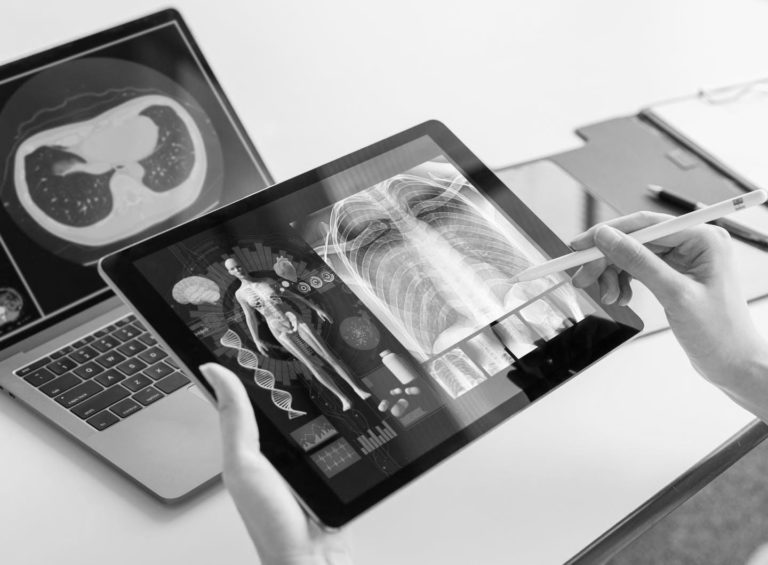The District Journal Team
Electronic Health Records: Italy Innovates!
In this epoch dominated by digitalization, every industrial sector is undergoing a continuous process of evolution and change, and the Italian healthcare system is no exception. A fundamental and unavoidable component of this radical transformation is represented by the Electronic Health Record (EHR), a highly complex and stimulating project that involves navigating through a series of challenges both at a technological and regulatory level.
The EHR, which is an efficient and neatly organized digital collection of medical information relating to a single patient, is at the very heart of this digital revolution. The market offers a wide range of solutions for its implementation, frequently characterized by a series of acronyms such as EMR (Electronic Medical Record), EHR (Electronic Health Record) and FSE (Fascicolo Sanitario Elettronico). The EMR is a digital record focused on the medical information of a patient, collected by a single healthcare service provider. In contrast, the EHR is a broader and more complete record, which includes all health information of a patient coming from different sources. The FSE represents the Italian equivalent of the EHR.
However, one of the most significant innovations that is literally revolutionizing the sector is the application of blockchain technology in the management of the EHR. This technology, originally developed to manage cryptocurrency transactions, is demonstrating extraordinary potential in the healthcare sector, thanks to its unique ability to ensure data security, transparency, and traceability.
Blockchain can be used to create a decentralized and secure EHR, in which every transaction or update of medical information is permanently and immutably recorded. This means that once a piece of data has been entered into the system, it cannot be modified or deleted, thus ensuring the veracity and integrity of the information and the privacy of the patient.
In Italy, some cutting-edge companies are already implementing innovative solutions based on blockchain. Among these:
- H-Connect by 4wardPRO: This software uses blockchain technology to integrate it into its Clinical Data Repository, thus ensuring data integrity, security, and interoperability. H-Connect’s approach is patient-centered and aims to simplify clinical workflows, making this solution particularly complete and flexible.
- Almaviva: This Hospital Information System uses blockchain to improve and enhance the security and traceability of patient data. Almaviva offers a centralized view of the patient through a single hospital-level archive and lends itself to various purposes, including therapeutic, predictive, and administrative ones.
Therefore, blockchain represents a fundamental and decisive element for the evolution of Italian digital health. With its promise of overcoming bureaucratic challenges and providing a more efficient and secure management of health information, blockchain technology is ready to guide Italian healthcare towards a future of excellence and continuous progress. Its ability to revolutionize the management of medical information marks a significant step towards the goal of more effective, efficient, and safe healthcare for all citizens.
In the context of digital health, the adoption of blockchain-based solutions such as the Electronic Health Record marks the beginning of a new era. The technology not only promises to improve the efficiency of healthcare services but also to ensure the security and privacy of patient data. As we continue to explore the vast potential of blockchain, it is clear that its application in the healthcare sector will play a crucial role in shaping the future of healthcare in Italy and around the world.

Food for thought
Digital Transformation
We can see how deeply digital transformation reshaping sectors like healthcare is. Italy’s shift towards digitizing Electronic Health Records (EHRs) exemplifies this change, signifying the potential future of global health services. The EHR, a digital repository of a patient’s health information, is central to the digital healthcare revolution. Its benefits are numerous, but it presents unique challenges such as data security and privacy. Here, blockchain technology comes into play. Originally designed for crypto transactions, blockchain is a promising solution to these challenges. Its application in EHR management is a leap forward in ensuring data integrity, security, and transparency. Italy’s progress is inspiring. It’s not just about technology, but also about people – patients, healthcare professionals, and society.
In conclusion, the exploration of blockchain in digital healthcare opens a new chapter in global healthcare evolution. It reminds us that innovation is about using technology to create efficient, secure, and equitable healthcare systems.
